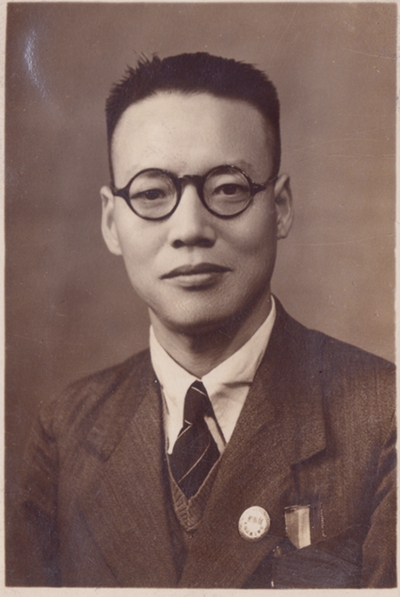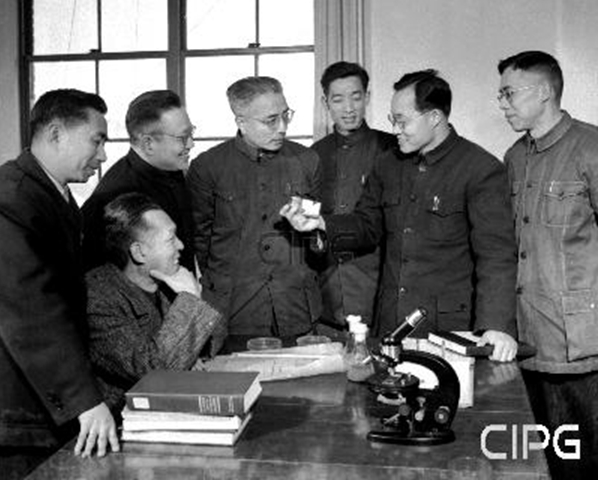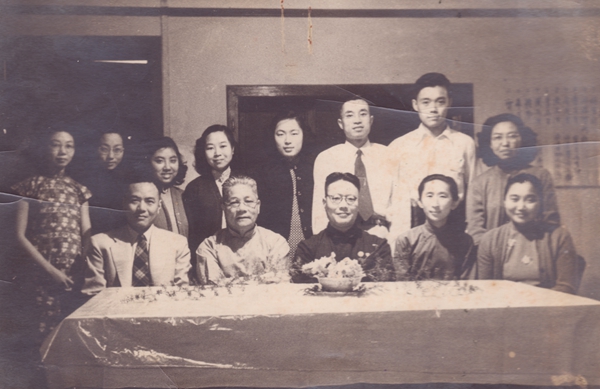Jin Peisong: Who Pioneered China’s Fermentation Industry
2016-12-13
The sail of the ancient fleet was furled so long ago that people fail to recollect what the vast sea looked like. Now he is looking to the east with no intention to conquer. Rather, he longs to have a dream come true. What he perceived is neither a city or a piece of land, nor a building or even a brick, but those wonderful micro-organisms invisible to the naked eyes. He is Professor Jin Peisong, a prestigious expert in microbiology research and an educator in China, who once risked his life during the War of Resistance Against Japan to save strains and won his National Medal of Victory.
A Lifelong Poem of Pains
In fiercely burning and suddenly expanding fireworks used their brief life to perpetuate their boundless brightness. It is in the flame that they are torn and taste great pains and it is after the bloom that they taste the loneliness left by the residue. Precisely because they have experienced endless sufferings, the dark happened to project their blooming splendor. This is what we call the power of ordeal. And against the agonizing ordeal, Professor Jin earned the everlasting respect from others.

Jin Peisong, also known as Jin Baiqing, was born on October 30, 1906 at Houcenshan village, Dongyang, Zhejiang Province where his childhood was spent in the rural area with books hanging on the buffalo horns to start this boy’s student life. The year of 1919 saw his school life at Changshan Primary School of Dongyang County before graduation in 1923 when he was enrolled into the Junior High School of Dongyang County for three years. And then he was admitted to the senior grades of Zhejiang No. 1 High School. The only source of income for the whole family when he was at school was to sell for money his home-made ham to the hotel where Jin stayed. Unfortunately, a fire forced the hotel to close down one year later, which resulted in his dropping out of school. Luckily, in September 1927 he was enrolled into Shanghai Agricultural University to study in the Agricultural Chemistry Department of its Agronomy College until his 1931 graduation.
After graduation, Fang Xinfang and he along with their professor Wei went to serve as research at Tianjin Huanghai Research Institute of Chemical Industry. Before long, Professor Wei left the Institute for Nanjing Central University to create the Agricultural Chemistry Department of its Agricultural College and one year later he became professor Wei’s assistant. The year of 1934 saw his service both as a technician at the Brewing room of Nanjing Central Industrial Laboratory and as a lecturer at the Agriculture College of Nanjing Central University at once. Thanks to a grant offered in 1936 by the Ministry of Economy of Nanjing Government, he furthered his study at the Biochemistry Department of the University of Wisconsin in the States. The year of 1946 saw his winning of his master’s degree and his work at its Northern Area Experiment Station of the American Ministry of Agriculture to the end of that year. His returning to China in 1947 put him on the position of director of the Industrial Fermentation Laboratory of the Central Work and Experiment Institute of Nanjing Government. He also taught biology and brewing at University of Shanghai and Fudan University while tutoring the undergraduate graduation paper. Over the War of Resistance Against Japan, his lectures were given at universities in Chongqing.

After the liberation of Shanghai in 1949, the Central Industrial Research Institute was renamed as Shanghai Research Institute of Sciences, and later was renamed as Shanghai Food Industry Research Institute of the Ministry of Light Industry where Mr. Jin worked as a grade-two engineer and director of the Industrial Fermentation Research Institute and worked part-time at Fudan University for one year. The year of 1956 saw his membership of the Jiusan Society. After 1958, he taught at the cadres school of the Ministry of Light Industry. From September 1959 to August 1965 he served as dean of the Industrial Fermentation Department of Beijing Institute of Light Industry. In September 1965 he transferred to serve as dean of the Fermentation Department of Hebei Institute of Light Industry (predecessor of the present-day Tianjin University of Science and Technology) until his death. Mr. Jin used to be member of the second and third Chinese Society of Microbiology council. In 1955 he served as member of the Technology Committee of the Ministry of Light Industry of the People’s Republic of China, and in 1966 was employed by the Ministry of Light Industry as deputy director of the books editorial board of fermentation science and technology.
Before liberation, he was director of Industrial Fermentation Laboratory of the Central Work and Experiment Laboratory of Nanjing Government. During the War of Resistance Against Japan, when Nanjing was attacked by Japanese air raids, he, disregarding personal and family safety, braved the bombing to save hundreds of strains from the laboratory into two leather suitcases to guarantee their safety by means of a tough escort all the way to the then rear of Chongqing while abandoning his family who were not together with for the transfer. After the victory of the War of Resistance Against Japan, in recognition of his behavior, Nanjing Government awarded him the Victory Medal of War of Resistance Against Japan.
After liberation, he was invited by East China People’s Pharmaceutical Company to participate in the forum on the production of penicillin, advising on the selection of penicillin-producing bacteria and their domestic raw materials substitution and other issues. In 1955 he carried out research into the strain breeding and industrial fermentation of the streptomycin and chlortetracycline production. With the support of Shandong Xinhua Pharmaceutical Factory, Mr. Jin started to study the production of calcium gluconate by fermentation since 1949. In 1954, Xinhua Pharmaceutical Factory established its first gluconic acid production workshop in China. He was once awarded a banner with a picture of Mao Zedong on it. In 1951 he started China’s early research in citric acid fermentation, and once tested with sweet potato starch as raw material in the production of citric acid and glycerol. After generations of efforts, this work by the 1980s became a leading international technology. In 1955, he collaborated with the PLA Academy of Military Medical Sciences on the research of the plasma dextran, and went into its production and application. Subsequent experiments were conducted on the production of edible yeasts using different feed stocks. As an authority in China in the field of microbial fermentation, he did a lot of work. During the Korean War, referring to the fact that many wounded soldiers in our army died due to a lack of plasma, painstaking efforts were exerted in the research of artificial plasma for a succession of ten years before its finally forced end in 1966. According to his words made to his family, a few more years given, he could eventually succeed.
As an academic authority, Mr. Jin was often invited to lecture by universities. After the founding of the PRC, he served once as a visiting professor at Fudan University, Tongji University and University of Shanghai. He usually lectured for free, which made the university leaders feel obliged and then sent to his Institute his pay which was donated by Mr. Jin to serve as the fund for the Institute to carry out research activities.
To Gain Independence, Ambition Cannot Be Deprived of.
In the memory of his children and grandchildren, Jin Peisong is a serious man highly meticulous about his job and so strict a person as to be somewhat impersonal.

As kids advance in age, money is a must for them to do what they want. But they never got pocket money from Mr. Jin. He always explained this way, “It is Okay to have enough to eat. There are still many people living a much harder life, so you must rely on yourselves for a life.”
Upon returning from the States, he declined a car with driver offered by his research institute. Instead, he walked to work every day despite the long commuting. Long duration of his research work often forced him to spend the night at his institute.
His family failed to make sense of his choice at that time. For example, one of his family members was entitled to receive free higher education as his privilege. His eldest son’s wish to study in Shanghai Theater Academy was ruined when he brought about his idea to his father. This is what he told his children, “This country is experiencing a hard time, so you have to be self-reliant. You should put what you have learned into useful practice in the factory or in the rural area. Otherwise, all is useless.” Having failed to understand his father’s idea, the infuriated son went to Harbin Military Aircraft Repair Workshop.
In 1958 Mr. Jin transferred to work in Tianjin. Before leaving, he returned his house to his former employer, which led to the homelessness of his married children. By no means would his daughter named Jin Ruifang understand his choice. Without a shelter, she had to live at the dormitory room, and so did his son-in-law who was working in the Railway Bureau as a dispatcher. Hence, the couple stayed separated for a long time. So, his kids did not understand what their father had done in that they were deprived of all the comforts they could have in life due to their father’s over-strictness.
According to Mrs. Jin, Mr. Jin is of a paternalistic style, strict with the kids and extremely enthusiastic about his work. Later on, during the “Cultural Revolution” when his health was rather poor, he once explained to his wife, “I know that children do not get the reasons why I did that. They are from my own flesh and blood, they are my dearest sons and daughters. As a father, how can I not love them. My purpose is to enable them to be self-reliant and to enjoy a secure future life made all by themselves.”
So, in their memory, Mr. Jin is only related to a red sweater, which was bought for all three of them with his hard-collected savings in 1960 when the three-year natural disasters left them a tough life. It is a love gesture befalling his grandchildren to make up for his failure to shower his children with enough love.
Life Is Long, Setbacks Are Short.
Life is no easy for any one, especially for scholars. Although a ten-year catastrophe claimed his life, his ambition survived.
When the “Cultural Revolution” came, with many “unwarranted” charges, he was imprisoned in the countryside stable. Besides such charges as “reactionary academic authority”, etc., there is the charge of “secret agent working for the Central Statistics Bureau” which was beleived to date back to the Nationalist Medal of Victory issued by Nanjing Government. At this point, his heart was still on his research. So, when the rebels came to find fault with him, he would take out the English version of Mao’s Selected Works to read which can serve two needs. For one thing, it was to avoid disaster; for another, it was is to stay sharp in English for his future job as soon as the normal order may be restored. But he did not live on until that day. When his kids received a critical telegram to make it by his side, he was lying on the ground of the hospital corridor, thin and weak, no longer tall and strong. The repeated callings of his kids sent his hand moving slowly once to catch his grandson’s little hand. Tears slowly out of his eyes did not bring him back. A few days later, he passed away.
Mr. Jin published dozens of research reports and papers in his lifetime, and compiled numerous books and teaching materials on the fermentation industry. During the period of the War of Resistance Against Japan, he compiled a book named “Food Industry” in a book series called “Industrial Issues in the War of Resistance Against Japan and the Founding of a New China”. After the founding of new China, he published a series of booklets on the production technology of “flavors and powders, caramel, rice wine, shochu, mosquito coils, vinegar and wine”, a great contribution made to the popularizing of the fermentation technology and food production technology. During his stay in Shanghai, he was hired by the Ministry of Light Industry to serve as a technology guilder in the breweries, monosodium glutamate factories, canneries and yeast plants. In 1965 he participated in the appraisal meeting hosted by the Ministry of Light Industry concerning the pilot work of both Fenjiu and Maotai. In the “Great Leap Forward” era, he actively participated in a number of experiments to produce liquor with food substitutes.
Mr. Jin’s close friends are many, such as Yan Jici, Chen Taosheng, Fang Xinfang, Qin Hanzhang, etc. They are all from the the fermentation domain. Before his death, his wife and children were told not to turn to Yan Jici, although they were town fellows, friends, and Dongyang High School alumni because seeking help from him equals to inviting him harm. To protect them from persecution, what he disliked most was to seek help from his good friends.
On June 7, 1969, Mr. Jin, because of a sudden attack of hypertension, left us for good. To his children’s surprise, their grandfather’s innocent vindication was thanks to one of his American classmates. When President Nixon visited China in 1972, his accompanying officer who used to be his good friend at University of Wisconsin told Zhou Enlai, “I want to see Jin Peisong, a micro-organism expert, here in China.” So the relevant departments were asked to launch the search efforst and found that he died in 1969 in Tianjin. Premier Zhou was very concerned about this matter. But, his innocent verdict was not announced until 1978. And in 1980, his ashes were removed by the government from his hometown to the revolutionary martyrs cemetery in Tianjin. Only now are the children and grandchildren able to understand his seemingly incredible practice. They will pass this self-reliance down to their future generations. Even in his persecution days, Mr. Jin was still obsessed with the preservation of strains and his unfinished textbooks, and asked his children to donate his collection of more than 2,600 copies of textbooks to the school library.
Editor’s Postscript: Those who have not yielded themselves to the ordeal will be persons of virtue and persons of achievements. Those who still cherish their innocence and kindness after ups and downs in life must be persons worthy of world praise.



